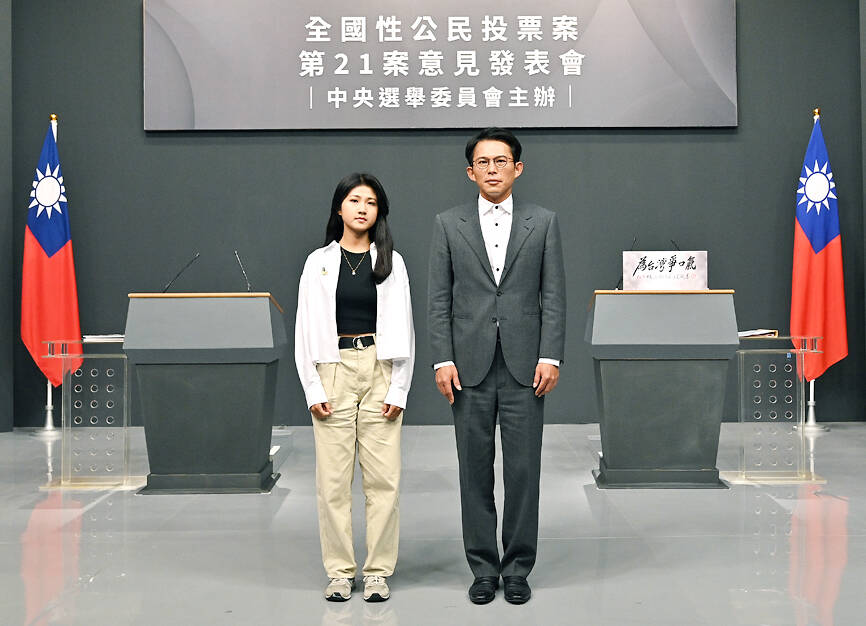A fourth televised public debate about restarting the recently decommissioned Ma-anshan Nuclear Power Plant next to Ma-anshan (馬鞍山) in Pingtung County was held yesterday, ahead of a national referendum on the controversial issue in less than two weeks.
A referendum on Saturday next week is to ask voters if they agree that “the Ma-anshan Nuclear Power Plant should continue operations upon approval by the competent authority and confirmation that there are no safety concerns.”
Taiwanese who are 18 years old or older can vote in the referendum.

Photo courtesy of the Central Election Commission
The vote comes just three months after the power plant’s final reactor shut down on May 17, officially making Taiwan nuclear-free.
Taiwan People’s Party Chairman Huang Kuo-chang (黃國昌) represented the side in favor, while 20-year-old university student Wu Ya-hsin (吳亞昕) represented the opposition.
Addressing concerns about whether nuclear power plants represent a national security vulnerability, Huang cited a report from the Center for Strategic and International Studies, a US think tank, that said Taiwan’s energy grid lacks resilience and needs nuclear power.
The report, a war game simulation of a Chinese blockade, said that the government’s decision to shut down the reactor for environmental reasons “greatly increased Taiwan’s energy vulnerability.”
The Democratic Progressive Party knows it should not abandon nuclear energy, as President William Lai (賴清德) last year confirmed that the government has contingency plans to maintain nuclear power capabilities, Huang said.
Huang downplayed concerns about the disposal of nuclear waste, saying that the Ministry of Economic Affairs has already engaged with nuclear disposal facilities in Europe for assistance.
A new technology, deep borehole disposal (DBD), is safe and feasible, and well suited for Taiwan’s small land area, dense population and plate tectonics, he said.
DBD is not a theoretical breakthrough — it is a turning point for nuclear policy, he added.
The Ma-anshan Nuclear Power Plant can still hold 562 bundles of nuclear rods, enough to power the plant for three cycles of 18 months each, or about five years in total, he said.
The plant is also finalizing plans to construct a new storage facility that would allow it to continue operating without concerns, he said, adding that the claim that its service life can only be extended by four to five years is “completely false.”
Wu brought up the example of Japan’s Fukushima Dai-ichi nuclear power plant disaster.
Fourteen years later, 24,000 residents still cannot return home due to concerns about radiation, and at least 300 young people have developed thyroid cancer, she said.
She read out loud a letter from a resident of Fukushima, which mentioned the numbers and stated that a nuclear accident can have consequences for up to a century.
Many people claim nuclear power is inexpensive and clean, but the Fukushima experience shows that costs and recovery time in the aftermath of an accident are enormous, she added.
She cited the latest report by Taiwan Power Co saying that the Ma-anshan reactors lie only 900m from a fault, adding that when the plant was first built, geological knowledge lagged far behind what it is today.

A preclearance service to facilitate entry for people traveling to select airports in Japan would be available from Thursday next week to Feb. 25 at Taiwan Taoyuan International Airport, Taoyuan International Airport Corp (TIAC) said on Tuesday. The service was first made available to Taiwanese travelers throughout the winter vacation of 2024 and during the Lunar New Year holiday. In addition to flights to the Japanese cities of Hakodate, Asahikawa, Akita, Sendai, Niigata, Okayama, Takamatsu, Kumamoto and Kagoshima, the service would be available to travelers to Kobe and Oita. The service can be accessed by passengers of 15 flight routes operated by

MORE FALL: An investigation into one of Xi’s key cronies, part of a broader ‘anti-corruption’ drive, indicates that he might have a deep distrust in the military, an expert said China’s latest military purge underscores systemic risks in its shift from collective leadership to sole rule under Chinese President Xi Jinping (習近平), and could disrupt its chain of command and military capabilities, a national security official said yesterday. If decisionmaking within the Chinese Communist Party has become “irrational” under one-man rule, the Taiwan Strait and the regional situation must be approached with extreme caution, given unforeseen risks, they added. The anonymous official made the remarks as China’s Central Military Commission Vice Chairman Zhang Youxia (張又俠) and Joint Staff Department Chief of Staff Liu Zhenli (劉振立) were reportedly being investigated for suspected “serious

ENHANCING EFFICIENCY: The apron can accommodate 16 airplanes overnight at Taoyuan airport while work on the third runway continues, the transport minister said A new temporary overnight parking apron at Taiwan Taoyuan International Airport is to start operating on Friday next week to boost operational efficiency while the third runway is being constructed, the Ministry of Transportation and Communications said yesterday. The apron — one of the crucial projects in the construction of the third runway — can accommodate 16 aircraft overnight at the nation’s largest international airport, Minister of Transportation and Communications Chen Shih-kai (陳世凱) told reporters while inspecting the new facility yesterday morning. Aside from providing the airport operator with greater flexibility in aircraft parking during the third runway construction,

American climber Alex Honnold is to attempt a free climb of Taipei 101 today at 9am, with traffic closures around the skyscraper. To accommodate the climb attempt and filming, the Taipei Department of Transportation said traffic controls would be enforced around the Taipei 101 area. If weather conditions delay the climb, the restrictions would be pushed back to tomorrow. Traffic controls would be in place today from 7am to 11am around the Taipei 101 area, the department said. Songzhi Road would be fully closed in both directions between Songlian Road and Xinyi Road Sec 5, it said, adding that bidirectional traffic controls would